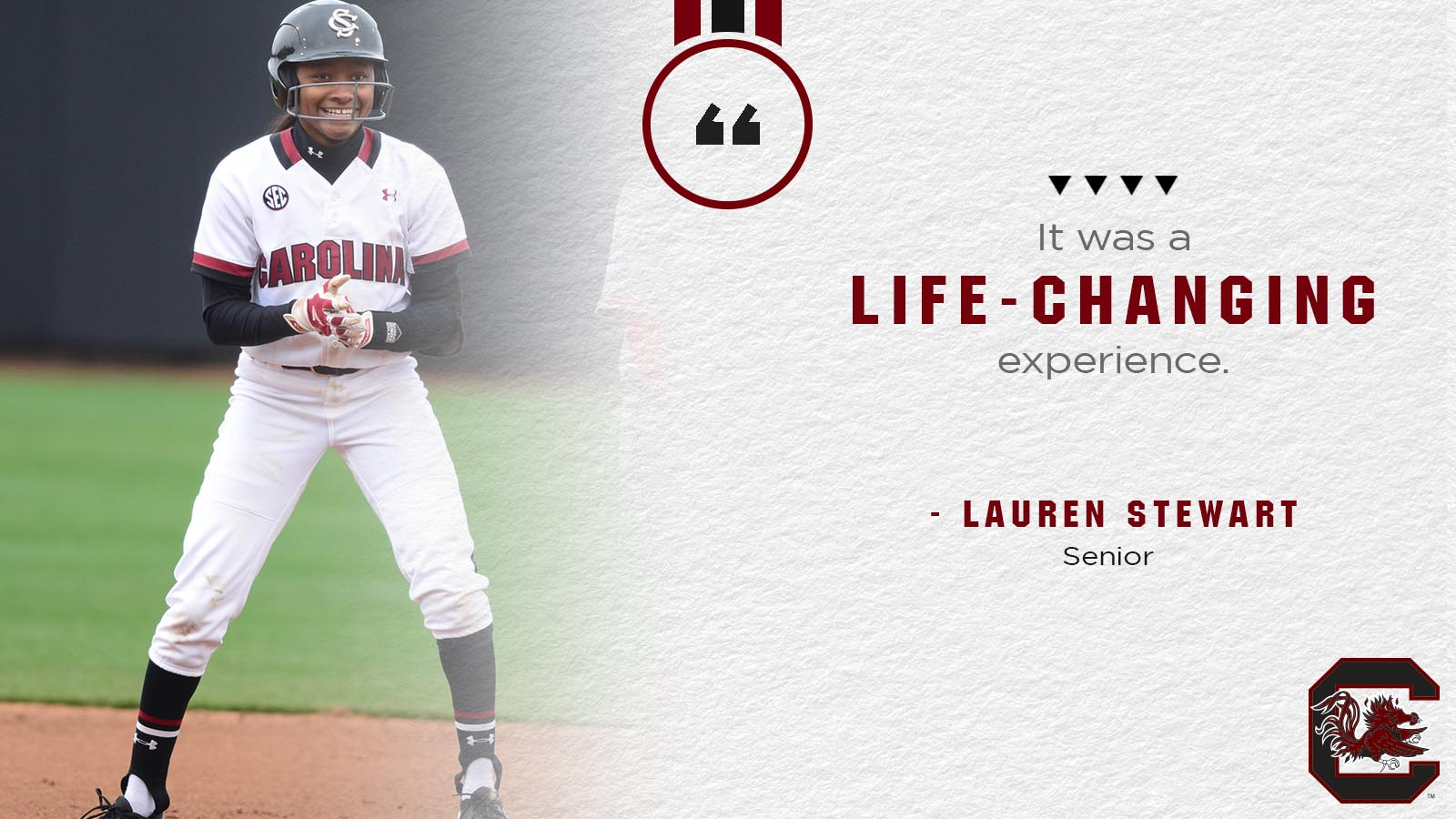
Mental Health & Ending Stereotypes Topics at Black Student-Athlete Summit
Mental health for student-athletes and breaking down stereotypes regarding black student-athletes were among the topics heavily discussed at the Black Student-Athlete Summit in Austin, Texas, which was attended by South Carolina softball senior Lauren Stewart and recent volleyball graduate Mikayla Shields in January.
“A large majority of the presentations were centered around mental health,” said Shields, who is currently playing professionally in Finland after graduating in December with a degree in biological sciences. “One of the presentations that really stuck with me was on the mental health side when athletics is ending. I think that is something that every athlete goes through. It’s really hard for a lot of people to put away their equipment for the last time and shut down that chapter of their life. Sometimes it can result in serious depression systems or a dark period for some people.”
“This was the University’s first-time sending people,” Stewart said. “What I learned from the summit is that black student-athletes experience a lot of the same issues and challenges across the different sports we play.
“This year we talked about the mental health of the black student-athlete and how it impacts our lives overall. The traumas and chronic stresses that affect black student-athletes was a key topic of discussion. When I was first asked to attend the summit, I knew how important it would be for me.
“Being in the situation where I’m entering my senior season while recovering from my second surgery, the ‘Redefining Self After Injury’ presentation really hit home for me. Because I have gone through the transfer experience, the ‘Transfer Student Athlete Success’ was another one of the many presentations I identified with on a personal level.”
Being a minority in a particular sport was also a major topic of discussion.
“Fortunately, I’ve never been part of a program where I felt like being the only black girl was a terrible thing.”
– Mikayla Shields
“My entire life I’ve often experienced being the only African American in the setting, whether that be in class, on a travel ball team, or even now on my college team,” Stewart said. “Unfortunately, there are not as many African Americans in the sport of softball being represented at the college level.”

“I was one of only around three or four African Americans on my team,” Shields said. “Getting together and sharing those struggles and finding out how people made a difference because of that was interesting. There are microaggressions that people talk about that people don’t realize might be a problem because they might not have been around black people before. Something stereotypical as a black female student-athlete is when people want to touch my hair, without my permission. My teammates would ask first, and that was really important to me. I haven’t experienced the negative side of it, but I met girls at the summit who went through that. From the male student-athletes there, we heard stories about coaches who would say things like, ‘you’re a black dude, you should be tougher. You should be able to handle that workload.’
“Fortunately, I’ve never been part of a program where I felt like being the only black girl was a terrible thing. I really appreciate South Carolina Athletics for that, because it really goes to show how much people there care about my well-being as a woman and as a student-athlete and as a black girl. I never felt like the odd man out.”
In dealing with stereotypes, the student-athletes noted that it was important for people to see them as more than just athletes, but also as people who are interested in different areas of study and want to get into different professions.
“When they see a big guy, they assume that they’re just a football player,” Stewart said. “But really, there are kids who are majoring in science and the arts, and they have such high goals for themselves. They know what they want to do. Some people said that other people thought they were lazy or that they only cared about their sport. They said that wasn’t true, and you just have to break that mold of the stereotype.
“Then there’s a side where you may play a sport that not many black athletes are playing. A lot of times when we are seen, it’s assumed that we play football or basketball or run track. I get asked countless times, ‘what event do you do?’ I’m like, ‘I do centerfield!’ A lot of us feel like we get put into this box sometimes of what we can play or what we should play.”
Understanding the importance of having role models and perhaps being a role model for others, Shields and Stewart want to see more Gamecocks go to the summit earlier in their careers so they can have more time to share what they’ve learned with their respective programs.
“I was thinking, if only I was a sophomore or junior, I would have more time to make a difference at South Carolina,” Shields said.
“Growing up, I always knew that I wanted to play softball in college,” Stewart said. “I played other sports, but I knew softball was my passion. Baseball is in my blood. I had great uncles who played in the negro leagues. I knew that’s what I wanted to do. I was watching Natasha Watley when I was four or five years old. I grew up in Georgia, but I wanted to attend UCLA for the longest time because of Natasha Watley. She was a black shortstop for UCLA. I understood from a young age how important representation was.”
“I try to represent myself as someone they should want to look up to.”
– Lauren Stewart
In discussing both of these topics, Stewart and Shields felt good about their respective experiences at South Carolina.
“South Carolina is very diverse for a predominantly white institution,” Stewart said. “Just sending people to this shows a lot about our program. I encourage every university in the country to send athletes every year. This is an event that every black student-athlete in the country needs to experience at least one time. I wish I was able to attend earlier in my college experience because it answered a lot of questions I’ve had over my college years.

“I also had the chance to connect with professionals within my specific career interest. I aspire to be a sports journalist and broadcaster. Amazingly enough, (sports journalist) Jemele Hill was a guest speaker at the event. I see so much of myself in her, so it was a blessing to hear her speak about her life as a black woman in sports and how she overcomes daily obstacles.”
In terms of the mental health discussion, breaking down the stigma in getting help is a big part of the process that schools need to continue to make progress.
“When I look back the resources that have become available, I feel like we have taken great steps (at South Carolina),” Shields said. “We have sports psychologists and regular psychologists readily available to help. That’s really great. We’re also told about the various help centers on campus that can help and are fantastic resources. Now we have to continue to make sure that everyone is aware and know how we can help our teammates get help. I think that will be the next big step.”
Upon returning from the summit, both Gamecocks are excited to share what they’ve learned.
“This summit was really one of the best experiences of my life,” Stewart said. “It was a life-changing experience.
“Before every game, I’m thinking about when I was younger and Natasha Watley, because that’s who I looked up to. I realize that now, I am that person. When I’m back home, I volunteer with an all-black softball team. It’s a pretty unique and cool experience. They look at me like I’m a cool celebrity. When I go out there each time on the field, I try to remember that. I try to represent myself as someone they should want to look up to. I think about that every single time I go out to practice. I just want to show every single little girl that we can do whatever we want to. We can set our mind and accomplish any goal we want to, as women.”



















